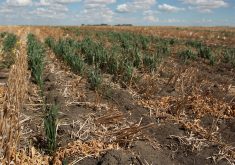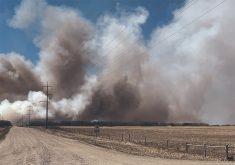Increase AgriStability support to 85 from 70 percent of the reference margin and compensate producers for the carbon tax expense on grain drying. Farmer and farm group seem to have galvanized around these two requests, but neither are as simple or effective as they seem.
Producers are justifiably upset over a carbon tax that applies to the propane and natural gas used for grain drying, particularly in a year when such a large percentage of grain has had to be dried. Gasoline and diesel for farm use is exempt. Why not propane and natural gas?
Read Also

Proactive approach best bet with looming catastrophes
The Pan-Canadian Action Plan on African swine fever has been developed to avoid the worst case scenario — a total loss ofmarket access.
There’s a good argument for exempting propane and natural gas. If you think that’s important for grain drying, think of what it means for greenhouse operators and intensive livestock operations.
However, rebating the carbon tax after the fact would be administratively difficult and it would not be entirely equitable. If you sold tough or damp grain to someone with drying capability, the carbon tax cost should have been built into the price discount. Rebating the carbon tax will help the grain drying buyer, but not the producer who sold the grain.
Overall, grain drying isn’t the biggest harm being caused by the carbon tax. While it’s the most visible and quantifiable, it’s just the tip of the carbon tax iceberg, which also adds to the cost of nitrogen fertilizer manufacturing, custom trucking and railway transportation.
That’s why a carbon tax is such a stupid policy approach. Consumers don’t even know how much carbon tax they pay when they fill up their SUV or motor home. It won’t change consumption patterns unless the tax is increased to an onerous level.
But it does diminish the competitiveness of Canadian business. Other than fuel for grain drying, we don’t really know how much the carbon tax is costing us. And we certainly can’t pass those costs along to either domestic or export customers.
In many ways, increasing the AgriStability support level makes sense as a way to provide more farm support. A large percentage of producers have dropped out over the years, so increasing the support level would perhaps be a way to entice producers back into the program. Unfortunately, AgriStability has more problems than just the 70 percent support level.
It has never worked well for mixed farms that have both grain and livestock. Beyond that, it’s complicated with unpredictable support that isn’t bankable. Any revamp of AgriStability should go beyond the support percentage.
At the recent federal-provincial meeting of agriculture ministers, it was disconcerting to hear that more study over the next year is needed to provide proper information for possible changes to business risk management programs. The programs should have been analyzed and reanalyzed for years.
The price tag may be the real reason for delaying. The cost to the federal and provincial governments to go to 85 percent coverage is estimated at $300 million a year. We shouldn’t just blame the feds on this. Many provincial governments will not be keen on the extra expense either.
As grain producers, we sometimes think we’re the centre of the agriculture universe, but beef, pork, vegetable and fruit growers are all eligible for AgriStability. A change in support levels would have to apply to everyone.
Nothing is simple when it comes to farm support programs.
Kevin Hursh is an agricultural journalist, consultant and farmer. He can be reached by e-mail at kevin@hursh.ca.


















